What is Geotargeting Advertising: Types, Tools and Examples
Geotargeting advertising has become one of the essential marketing tools. According to Improvado statistics, 84% of US companies actively use it, and of those who don’t yet use it, 94% plan to implement it in their strategies in the future. Even the B2B sector is not an exception, with 71% of companies already using this technique and another 14% exploring its possibilities. Thus, geotargeting advertising is one of the top trends in modern marketing. Here's how to join this trend and get the most out of it.
What is Geotargeting Marketing
According to the classic definition, geotargeting is the provision of personalized content to people within a specific geographic region. Its accuracy depends on the goal of the marketing campaign, a company’s business model, and software functionality — we can talk about global regions, countries, provinces, districts, cities or even neighborhoods. Usually, geotargeting content refers to advertising appeals, but it can also include blog posts, newsletters, event invitations, etc.
It is also important to understand that targeting is rarely limited to geographic criteria. Other criteria are also added, such as demographic, socioeconomic, behavioral and technical (for example, by device type or screen resolution). This allows you to accurately determine a campaign's target audience, enhancing the impact and increasing profitability.
How Does Geotargeting Work
To define geotargeting, we will have to delve a little into the subject of modern wireless communication technologies. To provide personalized content, you first need to determine a user's current location. This can be done in several ways, including:
- A smartphone's Global Positioning System (GPS) module can determine a device's position with an accuracy of 1-50 m, depending on circumstances.
- Mobile communication antennas (GSM, GPRS, 3G, 4G, 5G) can calculate a user's location with an accuracy of 100 meters. A mobile operator only needs to know the signal strength at the three nearest communication stations.
- With a Wi-Fi module, when a person connects to a local access point in a restaurant, shopping mall, or airport, they are automatically "tied" to its IP address;
- When a Bluetooth transmitter is turned on, it constantly scans the environment. Even if a user does not synchronize it with other gadgets, it can signal them about its presence nearby.
The above information may look quite alarming. But don't throw away all your electronic devices and put a tinfoil hat on. All this information is used in a depersonalized form. The architecture of networks is built in such a way that they cannot be traced back to a specific person by identifying their personal and biometric data. Axios surveys show that smartphone users are generally not concerned about this — 96% of them believe sharing information about their location does more good than harm.
Geotargeting ads work much easier if we consider stationary devices like desktop computers. They mostly use IP addresses and data from Internet providers to determine a specific location. Even information voluntarily provided by a user through an online survey form may be a segmentation tool.
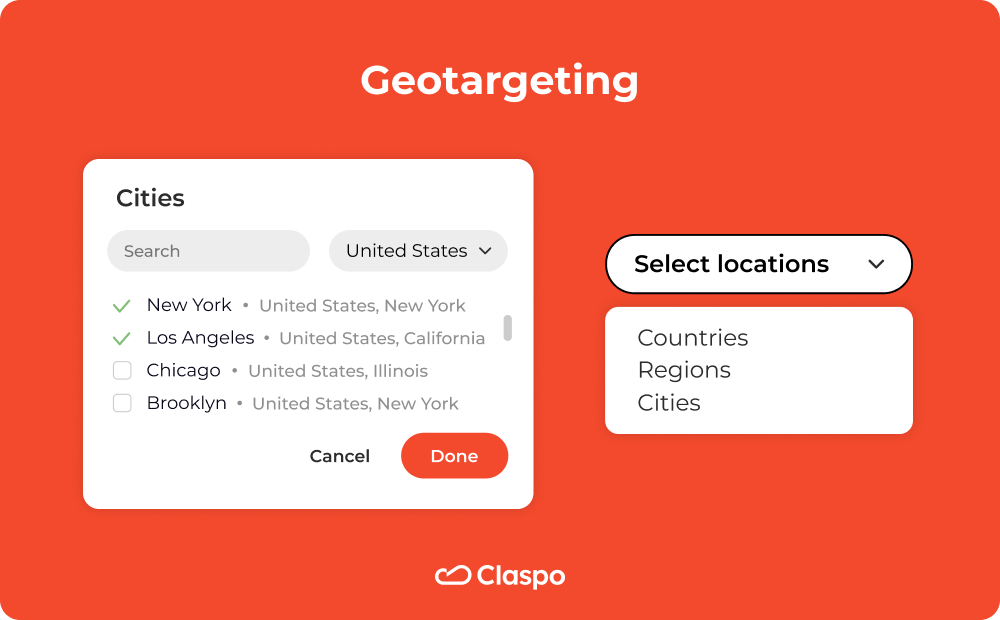
Benefits of Geotargeting Advertising
Geotargeting advertising makes it possible to deliver sales-focused or informational messages to the audience from the desired location. This increases the relevance, accuracy and effectiveness of this message for specific segments, providing a number of benefits:
1. KPIs growth
89% of marketers who use geotargeting report a growth in sales, 84% experience an increase in engagement, and 78% see an increase in response rates. But why go far for impressive numbers?
Claspo geotargeting allowed DeepStateMap, a nonprofit organization, to boost widget conversions by 32x! Interestingly, we developed this feature specifically for this client with the noble goal of targeting Russian Federation citizens with a call to surrender. But today, our geotargeting is widely used by many clients for commercial purposes. And it is not surprising. During this time, we enabled our users to choose not only countries but also regions or cities to display the most personalized message.
If you want to repeat the success of the marketers above, join us at Claspo!

2. Efficient use of marketing budgets
Geotargeting advertising affects the return on investment (ROI) of marketing campaigns. On the one hand, it narrows the circle of recipients of an advertising message, reducing costs. On the other hand, it makes a message more relevant and understandable to consumers, increasing the conversion rate. This allows you to maximize the return on your investment in advertising and marketing.
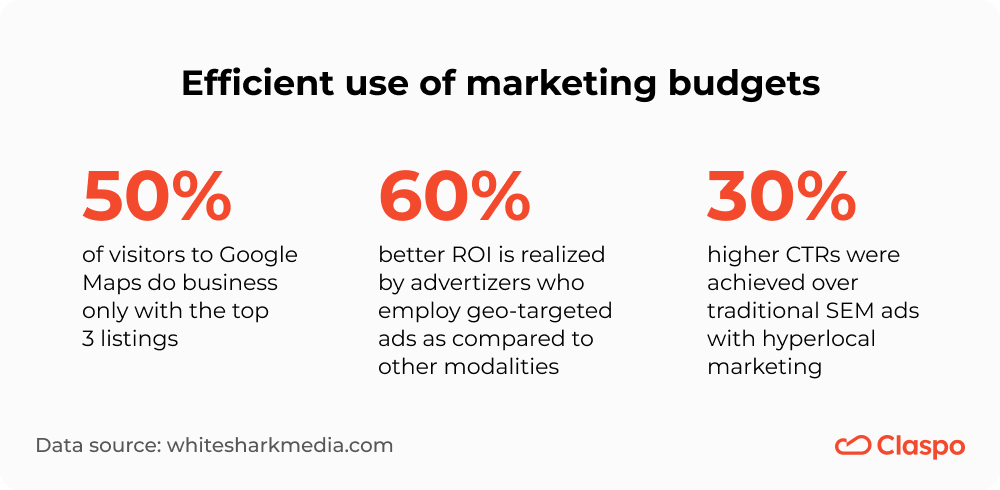
3. Increase the level of trust
People often trust local experts in areas such as real estate, landscaping, construction, engineering systems maintenance, food delivery, etc. By launching geotargeting advertising campaigns, you can demonstrate your knowledge of the local market and improve your company's reputation.
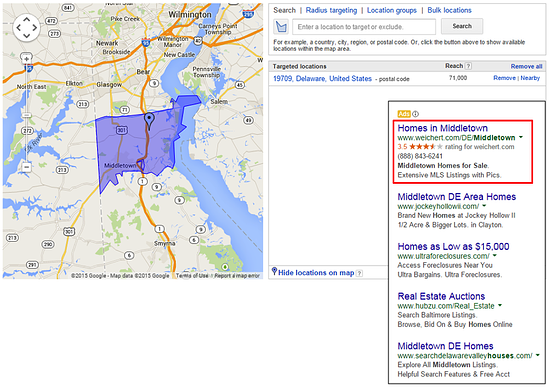
4. Hide ads from competitors
It is difficult to compete with stronger competitors using price factors or service terms and conditions. They are always able to make better offers to consumers. However, geotargeting advertising allows you to spread your message in areas where competitors do not advertise. This message will remain invisible to them for a long time.
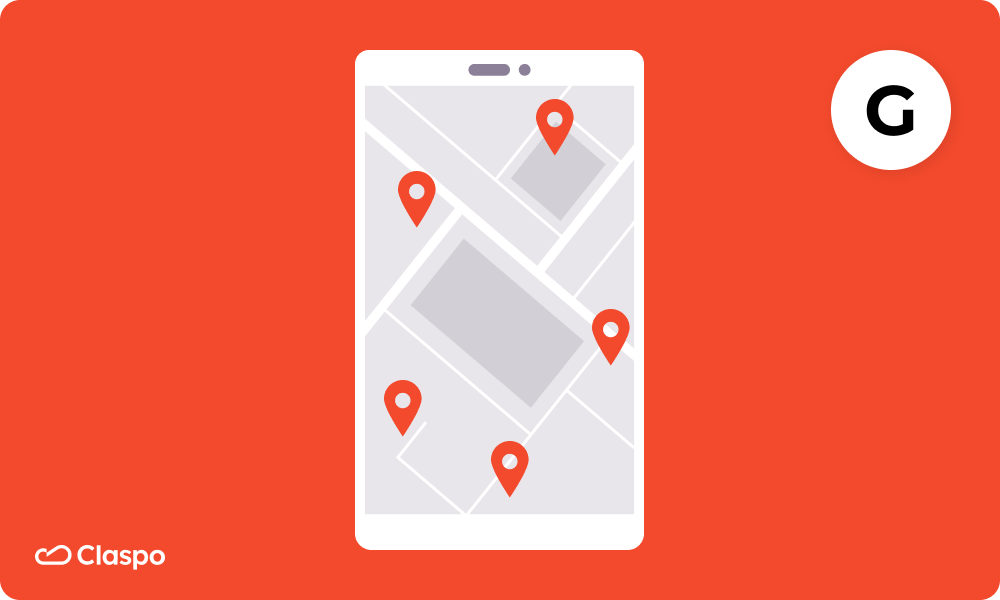
5. CTR improvement
Mobile geotargeting advertising shows a 40% higher CTR (click-through rate) than other advertising on mobile devices. Therefore, the amount of advertising targeted at specific locations promises to grow by 27% in the next three years.
Key Types of Geotargeting
- Classic geotargeting campaigns involve sending content to people in a specific location.
- Geo-fencing is the establishment of fixed zones where an advertising campaign is constantly running. When users approach them (for example, company stores), they receive notifications.
- Geo-conquest campaigns involve the deliberate launch of advertising in an area of influence of competitors, for example, in their geofencing areas or near their offices. This type of aggressive marketing allows you to win over a part of your competitor's customer base.
- Geo-event targeting means sending messages to people who are in the area of a mass event, such as at a stadium during a match.
- Hypercontextualized geotargeting takes into account not only the location but also the current situation. It allows you to customize messages depending on the weather, the number of people around, the noise volume, etc. This relatively new technology is not yet available in all regions and has a low level of accuracy.
Geotargeting advertising campaigns are also divided according to the way they define a geographic region. The simplest option is to choose a country or its separate administrative unit, such as a state in the United States, a province in France, or a canton in Switzerland. The second approach is to set the radius of displaying content around a specific point. It is more complicated but gives more accurate results.
Top 3 Examples of Geotargeting Use
Modern geotargeting technologies were launched in the early 2010s. So, today, there are already many examples of companies using these marketing tools. Let us tell you more about the most successful campaigns.
Hyundai Motor Co.
In the mid-2010s, the Korean car manufacturer decided to bring its brand positioning closer to the premium segment. To show these changes to consumers, they decided to work directly with people who were willing to buy more expensive cars. Therefore, to spread the message, the company chose areas around 550 competitors' car dealerships, mostly mid-range and premium brands.
In this example of geotargeting, users received personalized ads demonstrating the benefits of new Hyundai models and discounts of up to several thousand dollars in promotional codes. The campaign reached an audience of 815,000 potential customers and generated 41,000 leads.
Domino’s Pizza
This is an example of how the combination of high and traditional technologies yields excellent results. This American pizza chain is known for its balanced loyalty program that benefits both customers and the brand. One of its key elements is the "place of residence" line in the questionnaire of a regular customer.
Once the questionnaire is filled in, high technology comes into play. Domino's Pizza launches email, SMS, and push notifications with the following messages:
- offers to order delivery when it rains at a specific location;
- offers discounts during football matches in cities with prominent colleges and universities;
- launches pre-sale promotions on local holidays, such as City Day.
As of June 2023, the company has increased its return on investment in advertising by 400% by implementing geotargeting.
With Claspo, you can adopt Domino's Pizza's strategy. Creating pop-ups in the editor takes about 5 minutes. Therefore, if you want to time your campaign to a local event of any scale (even to bad weather), a site widget with the appropriate offer will appear on your site for visitors from selected locations with no delays!
What's more, you can use our geotargeting along with our campaign schedule feature. For example, you discovered that rainy weather will be in a particular city between May 20 and May 27. Specify the appropriate dates when setting up your pop-up, and it will appear and disappear on your site automatically at the set times.
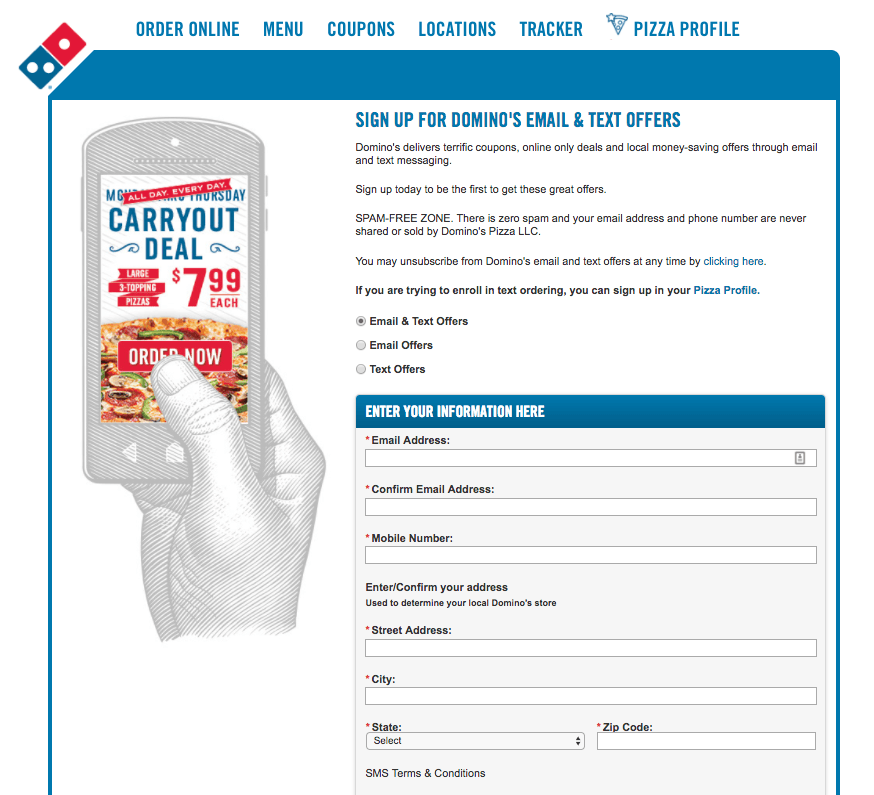
GasBuddy
Another example of how to use geotargeting most effectively is provided by the developer of an app for finding the best prices for automotive fuel. The company connected the function of automatic detection of a user's current location to its service. It offered a quick search for gas stations with the most favorable prices — not just by distance but also by a convenient route when driving a car.
Moreover, to advertise the GasBuddy app, the developers chose areas around the largest gas stations in each region. This increased the number of app installations by 60%, expanded the total audience by 24%, and increased the number of daily transactions by 5 times.
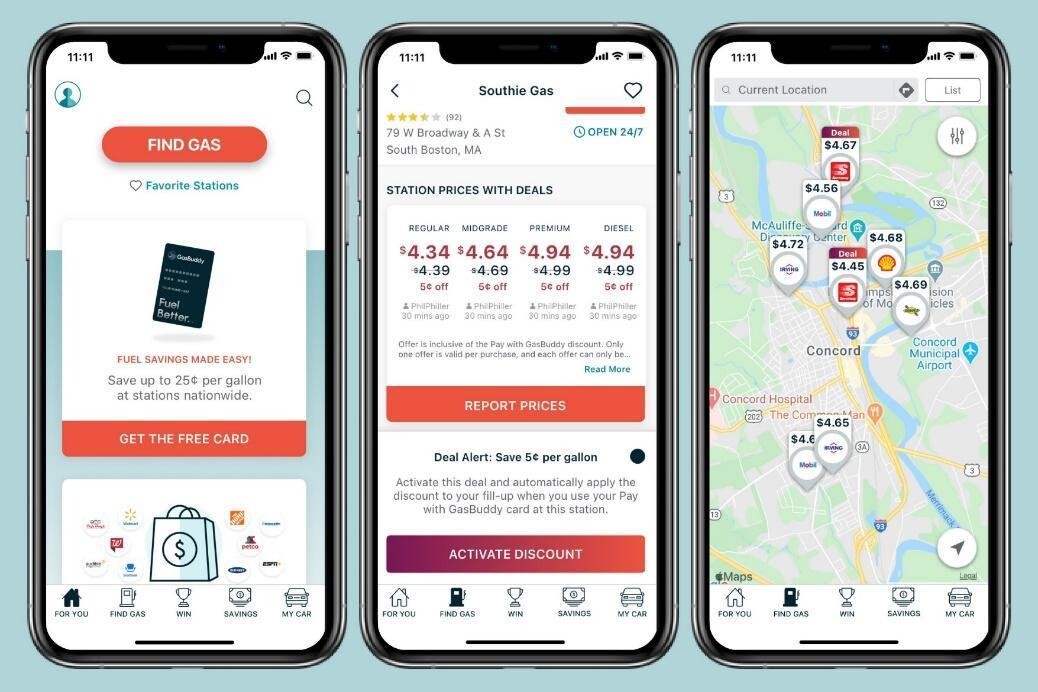
5 Best Geotargeting Tools
You don't have to develop high-tech solutions from scratch to run geotargeting campaigns. There are many digital tools available that allow you to select the right audience segment based on geography. Let's talk about them in more detail.
1. Claspo
Our smart platform makes it easy to set up geotargeting for pop-ups on your website. It literally takes a few clicks in the settings: you simply select the countries, cities, and regions where you want or do NOT want to show your widget. However, geotargeting is not Claspo's only feature for going international. You can also set the pop-up language to change dynamically. In this case, your message will automatically appear in the language of the user's browser or in the language they select on the website. Maximum personalization and exceptional user experience are guaranteed to increase your business results!
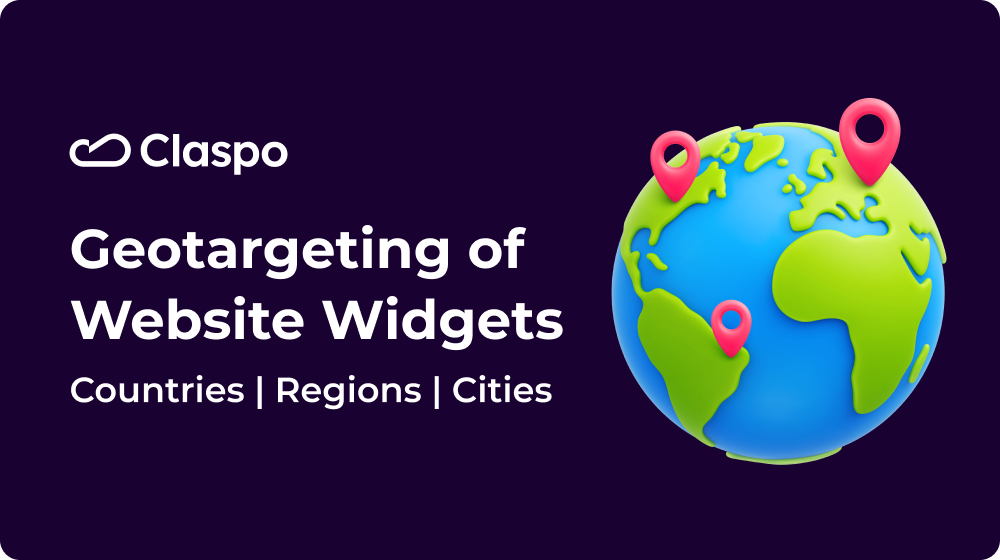
2. Google Ads
Google Ads is one of the most popular geotargeting tools. It allows you to select your audience at different levels — down to the city or even the city district in a megalopolis like London or New York. With Google Ads, you can link radius advertising to specific points on Google Maps, such as shops, restaurants and tourist attractions. Another advantage is the ability to exclude users from certain regions. For example, if a company does not have delivery to Arizona, it simply does not show its ads in Arizona.
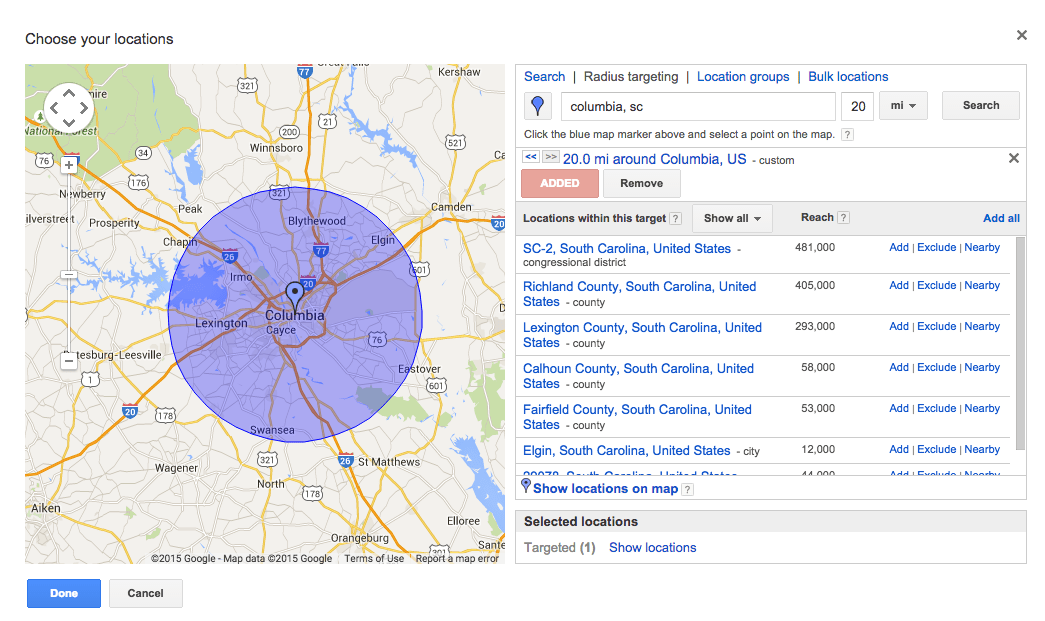
3. Facebook
The main advantage of geotargeting advertising on social media is the total audience of 2.8 billion potential customers. In addition, you can see advanced analytics on the dashboard to identify the most effective locations, campaigns, or specific advertising appeals and adjust your strategy accordingly. In addition, Facebook's targeting settings offer interesting options. For example, you can target your ads to "emerging markets," "regions with the highest social media activity," urban agglomerations and industrial parks.

4. X (former Twitter)
This social network has a very simple targeting system. In addition to countries and regions, you can target ads to postal codes (ZIP codes). And in large cities, you can assign ads to neighborhoods and even individual buildings. This opens up unlimited opportunities! X targeting is quite accurate thanks to a combination of GPS, Wi-Fi and IP addresses.

5. Snapchat
If a company works with a relatively young audience, this targeting tool deserves special attention. In terms of ease of use, it is similar to the X ad service in many ways. However, Snapchat targeting makes it easier to set the radius of a campaign. You can make any geographical coordinates the center of your campaign without being tied to the nearest object.
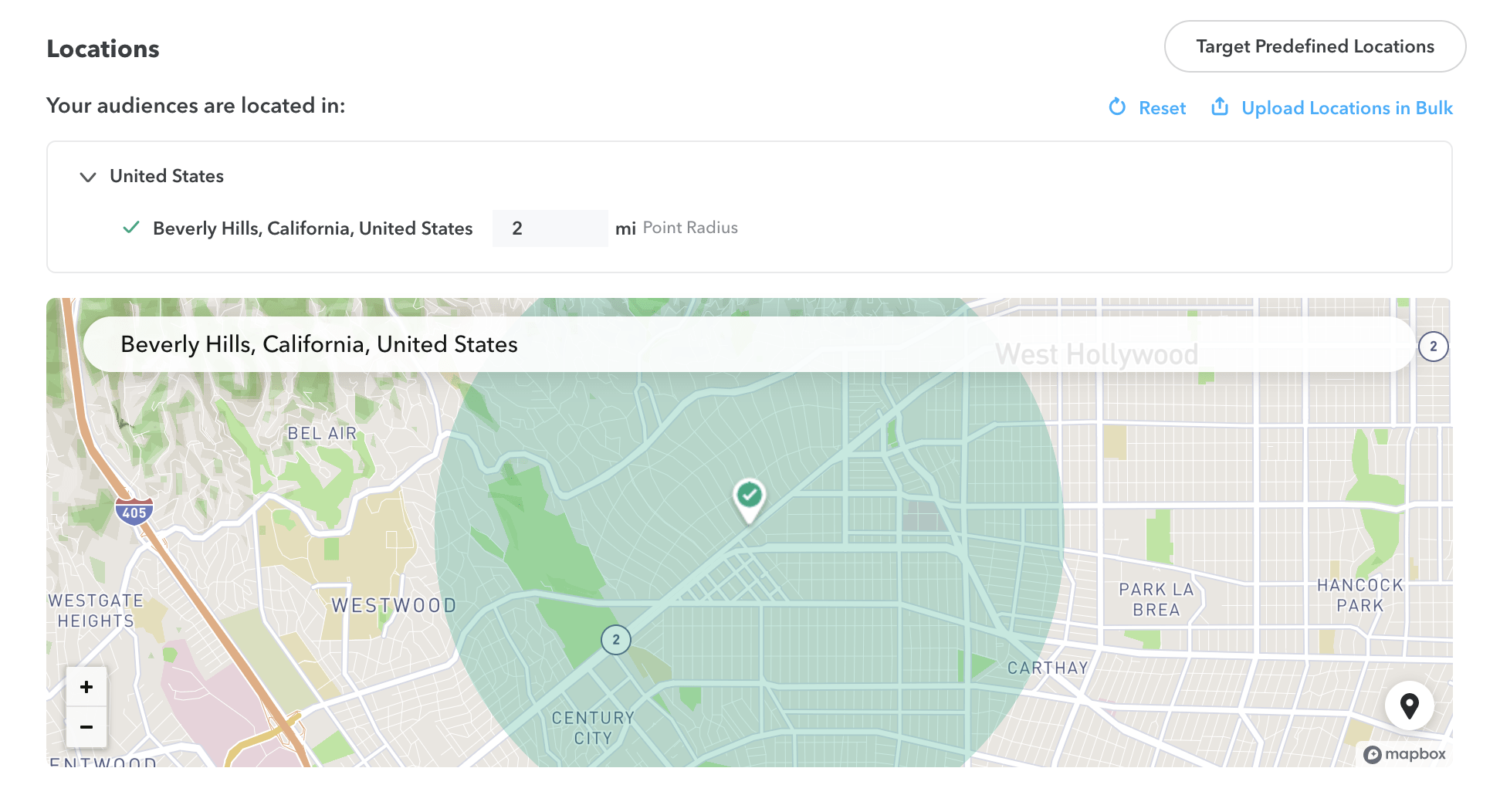
Geotargeting vs. Geofencing
Geofencing, as one of the most popular types of geotargeting campaigns, allows you to create a virtual line of demarcation that forms a circle with a certain radius. The center of such a circle is usually a company store or restaurant, a tourist attraction or even a competitor's office. When entering the circle, the user will automatically receive notifications from your business.
The difference between geotargeting and geofencing is that the latter gives marketers less room to fine-tune their campaigns. It can only notify you of a nearby point of sale or offer you alternative commercial offers. This technique is designed to work with broad audiences that are rarely segmented. Therefore, it is used when a business wants to increase its audience reach quickly and distract attention from competitors' offers.
When comparing classic geotargeting vs geofencing, the former is often a more convenient alternative. It allows you to flexibly customize the characteristics of your audience, link a notification timed with certain events, and not cross a boundary. In addition, you can define a geographic area not by a simple radius but by an administrative region — city, district, state, etc. Classic geotargeting works with a narrow, carefully selected audience of potential customers. It is used to increase conversion rates, spread brand awareness and improve a company’s reputation. When combined with automated lead distribution, geotargeting campaigns ensure that location-based leads are instantly routed to the most relevant teams or channels. This allows businesses to act on user intent faster and turn real-time engagement into higher conversions.
Go Global with Claspo
So, geotargeting is another opportunity to deliver a personalized message to the right audience segment. As the statistics in this article show, many companies are already actively using this opportunity and getting the most out of it. So why not follow their example? Claspo makes it easy to implement pop-up geotargeting on your website, your main online communication channel. The best part is that the geotargeting feature is available even in our free plan. Try Claspo now and melt the hearts of your audience from all over the world!






